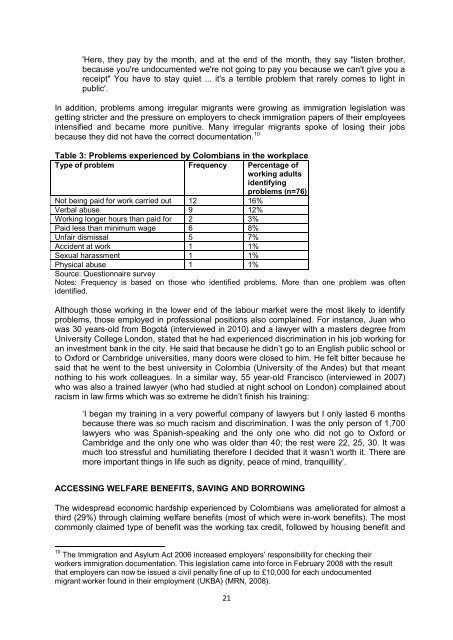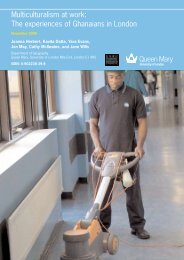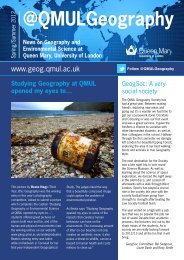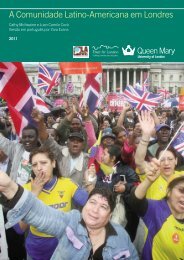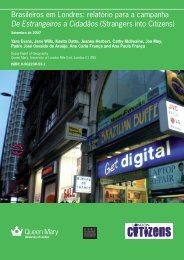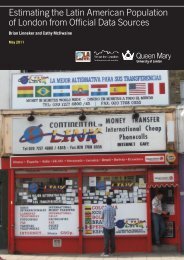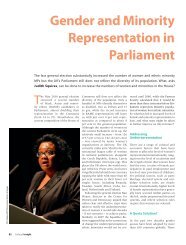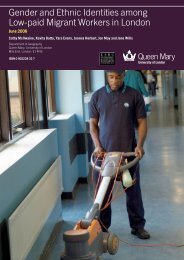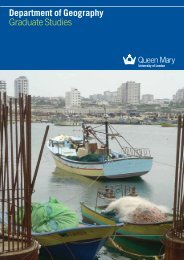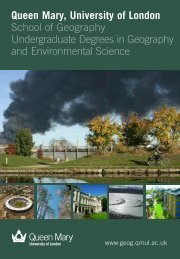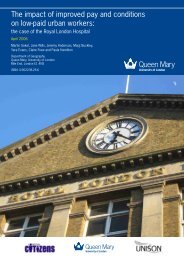The Colombian community in London - Geography - Queen Mary ...
The Colombian community in London - Geography - Queen Mary ...
The Colombian community in London - Geography - Queen Mary ...
- No tags were found...
You also want an ePaper? Increase the reach of your titles
YUMPU automatically turns print PDFs into web optimized ePapers that Google loves.
'Here, they pay by the month, and at the end of the month, they say "listen brother,<br />
because you're undocumented we're not go<strong>in</strong>g to pay you because we can't give you a<br />
receipt" You have to stay quiet ... it's a terrible problem that rarely comes to light <strong>in</strong><br />
public'.<br />
In addition, problems among irregular migrants were grow<strong>in</strong>g as immigration legislation was<br />
gett<strong>in</strong>g stricter and the pressure on employers to check immigration papers of their employees<br />
<strong>in</strong>tensified and became more punitive. Many irregular migrants spoke of los<strong>in</strong>g their jobs<br />
because they did not have the correct documentation. 10<br />
Table 3: Problems experienced by <strong>Colombian</strong>s <strong>in</strong> the workplace<br />
Type of problem Frequency Percentage of<br />
work<strong>in</strong>g adults<br />
identify<strong>in</strong>g<br />
problems (n=76)<br />
Not be<strong>in</strong>g paid for work carried out 12 16%<br />
Verbal abuse 9 12%<br />
Work<strong>in</strong>g longer hours than paid for 2 3%<br />
Paid less than m<strong>in</strong>imum wage 6 8%<br />
Unfair dismissal 5 7%<br />
Accident at work 1 1%<br />
Sexual harassment 1 1%<br />
Physical abuse 1 1%<br />
Source: Questionnaire survey<br />
Notes: Frequency is based on those who identified problems. More than one problem was often<br />
identified.<br />
Although those work<strong>in</strong>g <strong>in</strong> the lower end of the labour market were the most likely to identify<br />
problems, those employed <strong>in</strong> professional positions also compla<strong>in</strong>ed. For <strong>in</strong>stance, Juan who<br />
was 30 years-old from Bogotá (<strong>in</strong>terviewed <strong>in</strong> 2010) and a lawyer with a masters degree from<br />
University College <strong>London</strong>, stated that he had experienced discrim<strong>in</strong>ation <strong>in</strong> his job work<strong>in</strong>g for<br />
an <strong>in</strong>vestment bank <strong>in</strong> the city. He said that because he didn‟t go to an English public school or<br />
to Oxford or Cambridge universities, many doors were closed to him. He felt bitter because he<br />
said that he went to the best university <strong>in</strong> Colombia (University of the Andes) but that meant<br />
noth<strong>in</strong>g to his work colleagues. In a similar way, 55 year-old Francisco (<strong>in</strong>terviewed <strong>in</strong> 2007)<br />
who was also a tra<strong>in</strong>ed lawyer (who had studied at night school on <strong>London</strong>) compla<strong>in</strong>ed about<br />
racism <strong>in</strong> law firms which was so extreme he didn‟t f<strong>in</strong>ish his tra<strong>in</strong><strong>in</strong>g:<br />
„I began my tra<strong>in</strong><strong>in</strong>g <strong>in</strong> a very powerful company of lawyers but I only lasted 6 months<br />
because there was so much racism and discrim<strong>in</strong>ation. I was the only person of 1,700<br />
lawyers who was Spanish-speak<strong>in</strong>g and the only one who did not go to Oxford or<br />
Cambridge and the only one who was older than 40; the rest were 22, 25, 30. It was<br />
much too stressful and humiliat<strong>in</strong>g therefore I decided that it wasn‟t worth it. <strong>The</strong>re are<br />
more important th<strong>in</strong>gs <strong>in</strong> life such as dignity, peace of m<strong>in</strong>d, tranquillity‟.<br />
ACCESSING WELFARE BENEFITS, SAVING AND BORROWING<br />
<strong>The</strong> widespread economic hardship experienced by <strong>Colombian</strong>s was ameliorated for almost a<br />
third (29%) through claim<strong>in</strong>g welfare benefits (most of which were <strong>in</strong>-work benefits). <strong>The</strong> most<br />
commonly claimed type of benefit was the work<strong>in</strong>g tax credit, followed by hous<strong>in</strong>g benefit and<br />
10 <strong>The</strong> Immigration and Asylum Act 2006 <strong>in</strong>creased employers‟ responsibility for check<strong>in</strong>g their<br />
workers immigration documentation. This legislation came <strong>in</strong>to force <strong>in</strong> February 2008 with the result<br />
that employers can now be issued a civil penalty f<strong>in</strong>e of up to £10,000 for each undocumented<br />
migrant worker found <strong>in</strong> their employment (UKBA) (MRN, 2008).<br />
21


